A Lady’s Fortune (and the Joy of Bossy Fictional Characters Writing their own Story)
A Lady’s Fortune is my fourth historical novel set in the Regency when the Napoleonic Wars had such a significant effect on everyone’s lives. Having spent most of my writing life publishing biographies of people long dead, the history of their times really mattered, deepening the narrative and amplifying its truth. Similarly, with my fiction, history matters as much.
Here I have found that respecting my characters’ historical worlds has made it easier to recreate a past, inhabited by real people, men and women of blood and spirit. Their struggles and triumphs become entirely believable and recognisable to us sympathetically, even over the more than two centuries that separate us in time.
In this novel I really wanted to explore what happened to the wounded men who came back from war to a society that did not want to be reminded of the carnage and suffering happening just over the Channel. My hero, Lord Rokeby, is much more fortunate than most in that he has status and wealth but even he, scarred, limping from a badly mended shattered leg, sightless in one eye, is not encouraged to show himself in polite society where everyone is determined on enjoying themselves. Many wounded soldiers who were poor returned to homelessness and destitution and huddled round churches relying on alms and Christian charity.
Charles ll, urged by his mistress Nell Gwyn some claim, had founded in 1682 the Royal Hospital in Chelsea as a hostel for disabled army veterans. However towards the end of the long attrition of the Napoleonic Wars (1803-15) there were nearly thirty-seven thousand army pensioners, few of whom could be housed in the grand pensioners’ building of Chelsea Hospital. Hence my two heroines, Leonora Appleby and Charlotte Blythe are shocked to see the pathetic ragged band of ex-soldiers men trying to survive in the churchyards of London.
A character who arrived uninvited in A Lady’s Fortune is a Frenchwoman, Claudette Dupres, and although she takes up little space in the book she is hugely consequential in the story. She is a vivandière in the French army, a fascinating professional position for women who provided food, wine and other provisions to the soldiers on the front line. Inevitably these women also ended up rescuing and nursing the wounded, as Madame Dupres did our hero, Lord Rokeby, finding him cradling his dying brother on the battlefield.
Vivandière during Napoleonic wars with French troops
Some were noted for their heroism and others took up arms and fought alongside the men. These women were only able to make this their profession after the French Revolution when women’s rights were hotly demanded; what had been a masculine privilege offered only to soldiers now became a chance for women to run their own small enterprises.Women had always followed the army, as wives or prostitutes, and many had been involved in informal arrangements trading goods of various kinds. However, the vivandières were a proud group of professional women who were accepted in this capacity by the government and armies, existing right up to the end of the 19th century when they were phased out and men, retired veterans, replaced them.
These masculine vivandières became unpopular figures, seen as greedy, unhelpful, even nasty. On the contrary the female vivandières were perceived by the soldiers as generous, selfless, and friendly mother- and sister-figures. No doubt some too became lover-like figures to the lonely, frightened, suffering men so far from family and home and in constant danger, an extremity of danger shared by these women too.
When my character, Claudette Dupré, appears in A Lady’s Fortune this young woman arrives from Revolutionary France like a comet to disrupt the quiet English village where my main characters live. She also fills my heroine’s heart with admiration and fear as to the exact nature of her relationship with Lord Rokeby. Like a comet, her presence illuminates and burns away pretence and etiquette. My editor was so impressed by her she said she wanted a whole future novel based on this fascinating character!
And this is the joy of writing fiction. You can never be sure quite who will turn up to demand a place in your story. Madame Dupré arrived and gave me a psychologically interesting dynamic between my main characters and a pivotal point in the love story and I also found myself filled with affection and admiration for her personally. But above all she represented a band of successful female entrepreneurs, the vivandières, about whom not much is written or known. I did not know anything about these bold women until one appeared in my story and now I would very much like to give a vivandière a leading role in a subsequent book.
A Lady’s Fortune published on 5th August is my fourth book in this series set in the Regency. The previous three are The Marriage Season, An Unsuitable Heiress and The Scandalous Match. They all stand alone with new characters and situations each time and are published by Boldwood Books in hardback, paperback, ebook and audio.
Jane Dunn
Jane Dunn is an historian and biographer and Fellow of the Royal Society of Literature. Her first job after university was at British Vogue - she was runner-up in their annual talent competition and lucky enough to be offered a job in the editorial side of British Vogue. Jane began writing historical fiction, specifically set in the Regency in the time of the Napoleonic Wars. An elected Fellow of the Royal Society of Literature, Jane lives in Berkshire with her husband, the Classicist, Nicholas Ostler, and an elderly rescue whippet. You can find Jane on Goodreads and Twitter @JaneDunnAuthor






No comments:
Post a Comment
Thank you for commenting